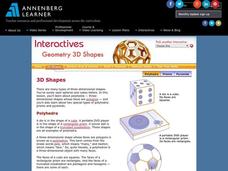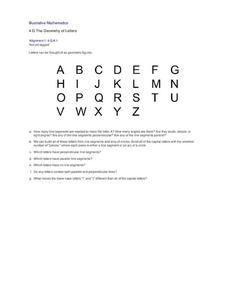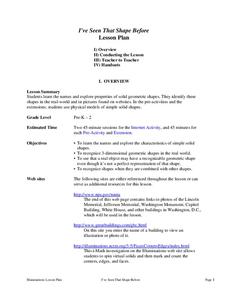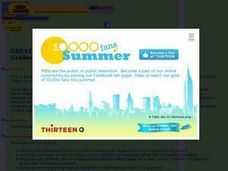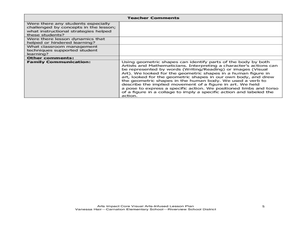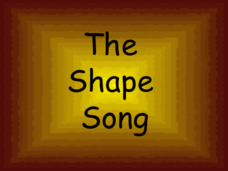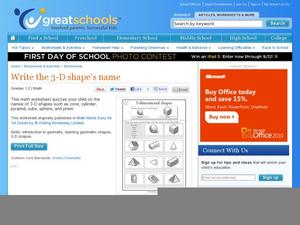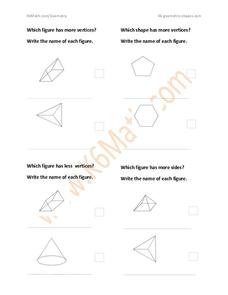Curated OER
Living in a Geometrical World
Students participate in a series of hand-on, online, and multimedia activities to examine 2 dimensional and 3 dimensional shapes. They describe common geometric solids. They construct rectangular prisms using straws and ribbon.
Curated OER
Geometric Shapes, Construction Perspective
Learners examine three different geometric solid shapes and their nets. They answer multiple choice, spatial awareness questions where they determine which view: front, top or either, the net represents.
Annenberg Foundation
Geometry 3D Shapes: 3D Shapes
Explore vocabulary related to three-dimensional shapes. An instructional website describes the characteristics of different geometric solids. Learners can use an interactive component to view nets, faces, vertices, and edges of common...
Curated OER
Symmetrical Geometry Paintings
Here is a clever, cross-curricular lesson that combines art and geometry. Learners design a painting that uses geometrical shapes and is symmetrical. Sponge-shaped geometrical figures are used to design half a page and fold them to...
Illustrative Mathematics
The Geometry of Letters
Use the alphabet as a tool for teaching your class about geometric figures. Break apart capital letters into line segments and arcs. Classify angles as right, acute, or obtuse. Identify parallel and perpendicular lines. An excellent...
Curated OER
Guess My Shape
Learners play a game with shapes. They work in groups to identify the names and characteristics of various shapes. They give each other clues to see if others can identify the shape being described. This is a great hands on activity.
Fayetteville Public Schools
I've Seen That Shape Before
The objectives in the resource allow students to explore the characteristics of simple solid shapes. Youngsters learn to recognize the face shapes, corners, and edges that make up 3-D figures by filling in a chart. Lastly, learners look...
Curated OER
Ocean Exploration: Shapes and Patterns Under the Sea
So many shapes in our vast oceans. Young explorers can discover new shapes in a variety of ways in this lesson. One way is having free exploration with a pattern shape kit handed out by the teacher. Another is by viewing a video, Ocean...
Curated OER
Using the Web to Explore Shapes
Third graders research the Internet to locate geometric designs in familiar buildings. They review shapes, solids, angles and symmetry as they research websites of familiar buildings in Louisville. They record the information they see...
Curated OER
Connecting Formulas Related to Geometric Figures
Students identify diagrams of quadrilaterals and circles by different names and classify the figures. They name the areas for each diagram and practice solving the formulas for each.
Curated OER
Great Shapes Alive!
Compare two- and three-dimensional shapes and construct three dimensional models from two-dimensional shapes. Diagram the shapes and reflect about the process in writing.
Curated OER
Bodies In Motion: Shapes and Gestures
Students use geometric shapes to describe body parts. In this geometry lesson, students use geometry vocabulary as they discuss body parts. They practice drawing bodies using shapes based on a wooden model that is poised to show specific...
Mathematics Vision Project
Geometric Figures
Logical thinking is at the forefront of this jam-packed lesson, with young mathematicians not only investigating geometric concepts but also how they "know what they know". Through each activity and worksheet, learners wrestle with...
Curated OER
Classifying Three-Dimensional Shapes
Compare geometric solids based on their properties. Your emergent geometers use spaghetti and marshmallows to build models so they can examine the number of faces, edges, and vertices on polyhedra of their own creation. Resource includes...
Curated OER
The Shape Song
As a review of geometric shapes, such as circles, triangles, and squares, this resource would be a terrific addition to a classroom lesson. The visuals are inviting and the number of sides to each figure are also identified. In addition,...
Curated OER
Tessellations: Geometric Patterns
Students create tessellation drawings using repeating geometric shapes.
Curated OER
Same Shape and Size
Can your kindergartners recognize shapes? What about when they are in different orientations? Youngsters study groups of shapes to determine which have the same shape and size. Two of the groups have triangles and ovals, and the other...
Curated OER
Write the 3D Shape's Name
Can your first graders identify a cone? What about a cube? Or a prism? Help them find the differences between these shapes with this instructional activity, which provides a word bank for three-dimensional shapes. For extra practice,...
Curated OER
Recognizing 3D Shapes, Part 3
Do your first graders know the difference between cones and cylinders? Use this handy activity to help youngsters learn geometric shapes. With prisms, spheres, and pyramids, among others, this resource prompts pupils to identify each...
Curated OER
Write the 3-D Shape's Name, Part 2
Geometry can be fun when you know the shapes! Twelve pictures of geometric shapes, including cones, pyramids, and spheres, prompt first graders to write the name of each shape in the space provided. Use the activity as a quiz or homework...
Curated OER
Sorting 2-Dimensional Shapes
Some shapes have square corners, and some do not. Scholars participate in a sorting activity as they determine if these 12 shapes have square corners, categorizing them based on this attribute. Encourage geometers to draw the square into...
Curated OER
Geometric Patterns
Geometric patterns illuminate this colorful and interactive PowerPoint. First, patterns must be identified. Next, students discern the missing color in a block pattern. Lastly, they observe a figure to determine how many blocks are used....
Curated OER
Geometric Shapes
In this geometry skills practice worksheet, learners respond to 8 questions that require them to identify vertices and name the pictured geometric figures.
K12 Reader
Shapes on a Plane
Geometric shapes are the focus of a comprehension exercise that asks readers to examine a short passage about planes, circles, triangles, and rectangles, and then to respond to a series of questions about the article.




